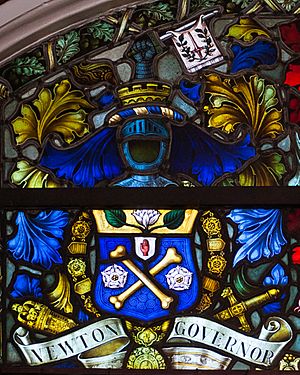Sir Alfred Newton, 1st Baronet facts for kids
Sir Alfred James Newton (born November 18, 1845 – died June 20, 1921) was an important British businessman. He helped many big stores, like Harrods in 1889, sell shares to the public. This helped them grow even bigger. He became the Lord Mayor of London in 1900. He also helped create a group of volunteer soldiers called the City of London Imperial Volunteers, who went to fight in the Second Boer War in South Africa. Sir Alfred passed away in 1921.
Contents
Early Life and Family
Alfred Newton was born in Hull in 1845. His father, George Beeforth Newton, was involved in shipping, and his grandfather worked in the whale fishing industry. Alfred was the sixth of seven children in his family.
In 1865, Alfred worked as a broker for grain and seeds in Hull. Later, in the 1870s, he joined his father in a yeast business. He then worked with his brothers, William and George Jr., in a shipping company called Newton Brothers. They bought a special diving boat to help with salvage work, like raising sunken ships.
In 1881, they got a large steamer ship called Principia. The British Government later rented this ship to transport soldiers and supplies to Egypt in 1882. That same year, the brothers opened a main office in London.
Helping Businesses Grow
After his brother William passed away in 1886, Alfred left the family shipping business. He then started helping other private companies sell shares to the public.
- In 1886, he became a director at the Norfolk and Suffolk Brewing Company.
- In 1888, he became the chairman of the Gaiety Theatre.
- In 1889, he became chairman of The President Land and Exploration Company.
- Also in 1889, he became chairman of the board for Harrods Store. He helped raise money to buy the store for £100,000.
Over the next ten years, he helped other big stores too. He was chairman for D. H. Evans and J. R. Roberts’ Stores. He was also a director for Crisp and Company and Paquin of Paris. While he was chairman of Harrods, he also helped them buy other well-known stores like Dickins & Jones in 1914 and Swan and Edgar in 1920.
Supporting Soldiers in South Africa
In October 1899, a war began in South Africa between the British and the South African Republic and the Orange Free State. A plan was made for the City of London to support a group of volunteer soldiers.
Lord Mayor Newton quickly agreed to help. Within days, he worked with various City groups, bankers, and merchants to fund this idea. The volunteer group was named the City of London Imperial Volunteers, or CIV. The first volunteers signed up on January 1, 1900, and left for South Africa on January 13. These volunteers were already part-time soldiers, which helped them get ready so quickly. Every member of the CIV received a special honor called the "freedom of the City of London."
A Special Honor
In May 1900, Queen Victoria visited the City of London. After her visit, she gave Alfred Newton a special honor called a Baronetcy. This meant he became Sir Alfred James Newton, 1st Baronet. His official title included "of The Wood, Sydenham Hill, Lewisham, Kent and Kottingham House, Burton-on-Trent, co. Stafford."

In 1906, he became the Governor of The Honourable The Irish Society, a role he held until 1921. As Lord Mayor, Newton also suggested people for important positions in the City of London. Two of these were his brother-in-law, Alfred Durant Watson, and his uncle, George Lord Beeforth.
A Judge in London
Because he was an Alderman of the City of London, Newton also served as a magistrate. This meant he helped make decisions in courts at the Guildhall and Mansion House.
On October 20, 1920, a famous woman named Sylvia Pankhurst appeared before him. She was a suffragette, meaning she fought for women's right to vote. She was also the editor of a newspaper called The Workers Dreadnought. She was accused of causing trouble because of articles in her paper. She spoke for herself, but Sir Alfred found her guilty and sentenced her to six months in prison.
Later Life and Passing
Sir Alfred Newton passed away at Harrods in 1921. He had traveled there with his wife. When they arrived, he became unwell and passed away. An investigation was held. The doctor who examined him said that Sir Alfred's heart was not in good condition. The jury decided that his death was due to heart failure.
Family Life
Alfred Newton married Elizabeth (Lily) Jane Watson. They had two children:
- Sir Harry Kottingham Newton, who became the 2nd Baronet (1875-1951).
- Muriel Prudhoe Newton (1878-1975), who married George Parsons in 1902.
Sir Alfred's great-grandson, the Rev. Sir George Peter Howgill Newton, is the 4th baronet. He is currently the vicar of Holy Trinity church in Aldershot.
Images for kids
 | May Edward Chinn |
 | Rebecca Cole |
 | Alexa Canady |
 | Dorothy Lavinia Brown |


